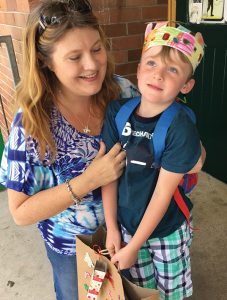THE MAJORITY OF PREGNANT WOMEN HAVE NOT HEARD OF A VIRUS THAT IS NOW THE LEADING NON-GENETIC CAUSE OF DISABILITY IN NEWBORNS, ACCORDING TO A NUMBER OF INTERNATIONAL STUDIES.
By: JO FORD

Kate Daly, a mother of four children including a set of twins born with congenital cytomegalovirus (CMV) in 2010, wants to help educate pregnant women and physicians about the dangers of CMV and how they can minimise their exposure to it during pregnancy to keep both mother and baby healthy.
“My son William was diagnosed at 3 weeks of age with permanent hearing loss caused by CMV. I was shocked to find out that there was something I could have done to try and prevent it and I hadn’t been told,” says Daly. “I would like to see pregnant women be informed of CMV and advised to practise basic hygiene if it can help keep babies alive and healthy.” William’s twin Emmaline has been extremely fortunate, with the virus only seeming to cause her a mild developmental delay.
Kate started the CMV Association of Australia when she realised there was little support for families in the same position. “I felt incredibly alone at the beginning, it was very scary and I wished at that time I had someone to talk to, someone that knew what I was going through.”
What is it?
Cytomegalovirus (CMV) in healthy people causes a mild, flu-like illness that can last for a few days or weeks. Some people might not even know that they have it. In susceptible people, such as those with suppressed immunity or for unborn babies of pregnant mothers, CMV can be more dangerous, even life-threatening. Many adults have already been exposed to it in their childhood but a few percent of women will have their first infection in their pregnancy.
How can it be spread?
Through coughing, contact with blood, urine or faeces or via the mucous membranes such as the mouth and genitals. Because the first infection often happens during early childhood, childcare workers are at greater risk. Like HSV (Herpes Simplex Virus) which causes cold sores; once a person has contracted CMV they will carry it for life. The infection lies dormant inside the body and can erupt without warning, although again, this does not usually cause symptoms and it rarely causes problems in pregnancies.
How can CMV affect an unborn baby?
Around 1 in 3 women who catch CMV for the first time in pregnancy will pass it on to their baby. When this happens, the condition is known as congenital CMV. About 1 in 5 of these babies have lasting problems such as deafness, poor eyesight, intellectual difficulties, an enlarged liver or spleen and a small head.
Can CMV be prevented?
To reduce transmission, pregnant women should regularly wash or disinfect their hands, particularly after direct or indirect contact with any child’s bodily fluids. This includes after changing nappies, meal times, wiping noses and handling toys that have been in mouths. Also avoid sharing food, drinks or utensils with young children whilst pregnant (www.cdc.gov)
There is currently no cure for CMV, although some centres are looking at treatments that may reduce the risk if pregnant women are infected. There is ongoing work trying to develop a vaccine.
Do the blood screening tests check for CMV?
CMV serology (immunity) tests can be performed but as there is no widely accepted treatment that alters outcomes it is not considered a routine pregnancy test and is therefore not recommended by the Royal Australian & New Zealand College of Obstetricians or Gynaecologists. All pregnant women should be advised about the prevention strategies listed above. CMV testing may be performed under certain circumstances in pregnancy, however. These include women at higher risk, those with symptoms of a viral infection, concerns about the growth or fluid volumes around the baby, or certain features seen on ultrasound.
Jo Ford divides her time between running Bodybump (pregnancy and post-natal aqua and fitness classes), teaching at Toorak College and bringing up two gorgeous girls, Lily and Rose. In her (limited) spare time, you’ll find her at the gym, practising what she preaches. www.bodybump.com.au

